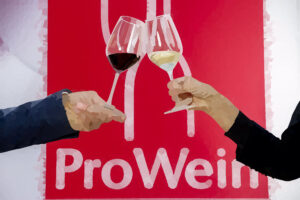
The topic of tariffs, and it could not have been otherwise, also held the spotlight on the day of the arrival at Vinitaly 2025, in Verona, of the EU Agriculture Commissioner, Christophe Hansen (whose words we have reported), accompanied on a tour among wine producers from all over Italy, by the Minister of Agriculture Francesco Lollobrigida, amid toasts and handshakes. The Commissioner spoke at the conference to detail the most significant measures of the “Wine Package”, which he proposed in recent days (and of which we had anticipated the measures on WineNews, in the aftermath of his visit to Rome), in support of the European wine sector, expressing “optimism” about a fast approval process: “I hope by autumn”, Hansen stressed. Opening the meeting was the president of Veronafiere, Federico Bricolo, who pointed out that Health Commissioner Olivèr Varhelyi was also present at the fair and was welcomed with dg Adolfo Rebughini. “Never had it happened that two European commissioners came together to Vinitaly to talk and discuss with producers”, Bricolo stressed, “it is an unexpected visit and shows that European institutions come to meet and support the wine world”. Support that Commissioner Hansen assured from his first words, “I am at Vinitaly to support the sector so that it wins in the world with quality. The sector is going through difficulties and the Commission is taking action. The markets are shaken by tensions. They have already been with Covid and wars. The world economy will suffer from tariffs and no one will benefit. The EU must continue to negotiate, hopefully there will be rapprochement on the other side as well”.
For Commissioner Hansen, “the U.S. market cannot be replaced, but we also need to look at other markets. We have negotiations with Japan, a very thriving market with which we have a trade agreement, where I will take a delegation of European producers in June, Mercosur, which is also a very interesting destination for high-quality food products, and India, a market with very high potential yet to be exploited for our sector, to open up space for European products. Consumption is going down and many regions are under pressure. The conclusions of the High Level Group have been used to find solutions, to help the sector be resilient and find new market opportunities”. And responding to questions regarding duties, he added that “we are ready to negotiate. The European Commissioner in charge (for Trade, Maroš Šefčovič, ed.) is also in continuous dialogue with his U.S. counterpart. We have an absolute interest in a de-escalation of the situation as soon as possible, because this would have a huge impact on the European economy, but also on the global economy. So I think this is the time to put our 'payload' on the table and have discussions with our counterparts”. Just in terms of the impact on the economy, and on businesses (with WineNews, from Verona, picking up the sentiment of wine producers present in the States, between concern and optimism), Hansen said, “what is certain is that, in the future, we will need a better Unity Safety Net to enable our businesses to survive. That’s why we have proposed our vision for the future of the agrifood sector, and the Unity Safety Net that provides a dual safety mechanism for businesses, on the one hand legislative and on the other financial, counterbalancing any effects and making us less vulnerable and less fragile to economic coercion”.
On labeling, the Commissioner stressed that “work is being done on new labels that will make it easier for consumers to understand, including new dealcolated or low-alcohol products. The path”, Hansen reiterated, “is to introduce a simplified, common Qr code for all member states. We know that some member states have gone a little bit further, with a single code we will protect the single market and Italian wines”. But, “beyond that”, Hansen added on the sidelines of the meeting, “we are open to the analysis of proposals from any member country, as long as they are not counterproductive to the single market, which, together with the free movement of goods, I think are extremely important and it is an objective of the Commission to safeguard this free flow of goods throughout the Union.
From Ice president Matteo Zoppas came the request, hearing these days from the wine companies present at Vinitaly 2025, “to ensure more flexibility (particularly that of financial management, ed.) in the measures that are made available to entrepreneurs in the sector”.
“Today everything is a priority for the sector, starting with duties”, noted Ceev President Marzia Varvaglione, “for our part, we propose to act as a go-between on negotiating proposals to find a solution to duties that must focus on dialogue and not confrontation”.
Minister Lollobrigida in his speech also spoke of the need for flexible tools to be offered to entrepreneurs to cope with the fast-changing market scenarios and climatic and geopolitical unpredictabilities that frequently arise. To Commissioner Hansen, the minister reiterated the need to review the Green Deal, “erasing some follies of an ideological vision harmful to agricultural enterprises. We need to verify”, Lollobrigida added, “what is right and feasible. On the issue of tariffs, the minister once again called for avoiding confrontation with the U.S. and instead indicated to Europe to “act with the wisdom typical of the Old Continent”. Lollobrigida also reiterated the importance of achieving a single label in the EU, asking the Commissioner to “intervene on models that use labels to condition people and not to inform, such as Irish labels that stigmatize wine as harmful”.
Copyright © 2000/2026
Contatti: info@winenews.it
Seguici anche su Twitter: @WineNewsIt
Seguici anche su Facebook: @winenewsit
Questo articolo è tratto dall'archivio di WineNews - Tutti i diritti riservati - Copyright © 2000/2026